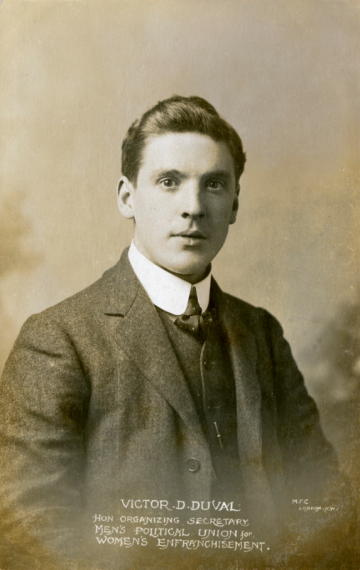Victor Duval
The full resource is FREE to all registered users of the website
If you are not already registered you can sign up for FREE website access to download the full resource.

- Born: 1885
- Died: 1945
- Claim to fame: He founded the Men’s Political Union for Women’s Enfranchisement (MPU).
Background
Victor belonged to a middle-class family, and his father was a German immigrant. The whole family were supporters of women’s rights; his mother and his aunt were members of the Jewish League for Women Suffrage. His sister Elsie was imprisoned and was one of the first women to be released under the Cat and Mouse Act, before going on the run.
Political activism
Victor was secretary of the Clapham League of Young Liberals but resigned due to frustration with the Liberal government’s refusal to recognise votes for women. After seeing a woman roughly thrown out of a Liberal meeting, he stated: ‘I am ashamed of the men who call themselves Liberal. I am ashamed of them because they have insulted women – they have dragged the flag of Liberalism in the gutter and have trampled on it.’
In 1910, Victor founded the Men’s Political Union for Women’s Enfranchisement (MPU) for men who wished to support the Women’s Social and Political Union (WSPU) or ‘suffragettes’, as men were unable to join. The MPU described itself as open to ‘men of all shades of political opinion’ who adhered to its principles and wished to ‘secure for women the parliamentary vote on the same terms as it is or may be granted to men’.
The men would also act as unofficial bodyguards to the women, after suffragette militancy became more violent and suffragettes became more liable to physical assaults and arrests. This often resulted in the men becoming victims of physical attacks.
In 1910, Victor went to prison after causing a disturbance at a meeting attended by the Liberal Cabinet minister David Lloyd George. In response, he wrote a political pamphlet, ‘Why I went to prison’. He also wrote ‘An appeal to men’. Victor was also imprisoned for five days in 1911 as a result of his campaigning activities.
In 1912, Victor married suffragette Una Dugdale. The two caused quite a stir when they insisted that the usual commitment to ‘obey’ was removed from their marriage service. Afterwards, Una published a pamphlet about it called ‘Love and honour – but not obey’. After 1918, Duval continued to campaign for equality and marriage reform.
Glossary
- Jewish League for Woman Suffrage – This was a suffragist group for British Jewish women and part of the National Union of Women’s Suffrage Societies.
- The Liberal Party – This was one of the leading political parties of that time and the main opposition to the Conservative Party. The Liberal Party claimed to be more progressive than their opponents but had failed to support women’s suffrage while in government.
Questions
- What might have motivated some men to join the votes for women movement?
- Do you think it was important that men campaigned for women’s rights?
- Why do you think Victor and Una changed the words of the traditional marriage service?
